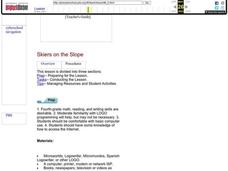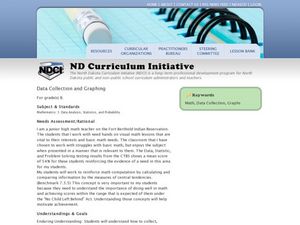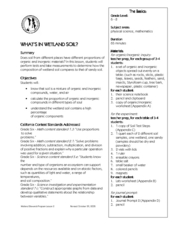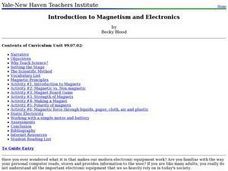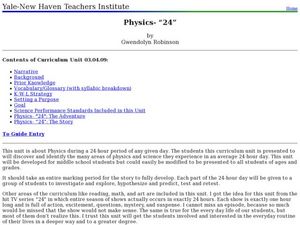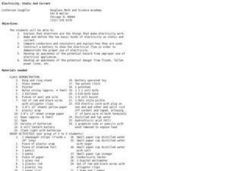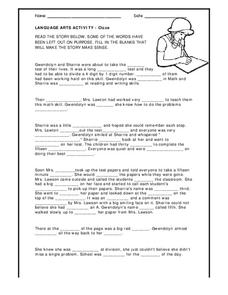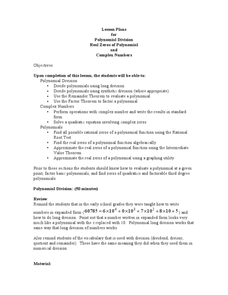Curated OER
Skiers on the Slope
Students explore mathematical concepts, problem solving, and the ability to program in LOGO to test ideas about speed, acceleration, gravity, and slope when dealing with downhill skiing.
Curated OER
Navigating by the Numbers
Students observe how math is important in navigation and engineering. They study how surveyors use math and science to calcute, count, measure, label, and indicate distances on a map. They estimate specific distances.
Curated OER
Data Collection and Graphing
Students collect data and graph it on a coordinate plane and analyze it. In this statistics instructional activity, students display their data collection using a graph. They determine which central tendency will work best.
Curated OER
What's in Wetland Soil?
Students examine the organic and inorganic components of soil. In this environmental science lesson, students identify the factors that influence soil formation. They collect soil samples, conduct tests, and analyze the results.
Curated OER
Introduction to Magnetism and Electronics
Students are introduced to the concepts of magnetism and electronics. As a class, they walk through the steps of the scientific method and define new vocabulary. In groups, they are given a bag of objects and they are to separate them...
Curated OER
Designing a Study
Students explore features to consider when designing a scientific study. In this science research lesson, students examine different methods of data collection and consider which method would be appropriate for determining how many types...
Curated OER
Physics -- 24
Students record all of the instances of physics and science they are involved with in a full day. As a class, they complete a KWL chart on physics and read a story about Murphy's Law and the character's experiences. Individually, they...
Curated OER
Electricity: Static and Current
Students investigate static and current electricity. In this electricity lesson plan, students observe 4 demonstrations and conduct 3 activities to explore the repulsion of electrons and the attraction of protons and electrons. They...
Curated OER
WHAT MAKES A LIGHT BULB LIGHT?
Middle schoolers are able to use inquiry to answer the essential questions. They are able to predict and test configurations of a battery, bulb, and wire that make the complete circuit. Students craft a group and individual theory of a...
Curated OER
Pollution in the Air and the Water Pollution Solution
Learners explore air pollution. In this ecology and air pollution lesson, students perform an experiment in which a Vaseline coated lid is placed inside and outside the classroom. Learners make predictions and then record what they see...
Curated OER
Solving One Step Equations
Students observe and demonstrate the step-by-step process for solving one-step equations. They view a teacher-created PowerPoint presentation, solve one-step equations, and in small groups create a PowerPoint presentation.
Teach-nology
Language Arts Activity - Cloze
Using context clues is an important skill when mastering reading comprehension. A cloze activity prompts learners to read each sentence in a short passage and fill in the blanks, based on what the rest of the sentence says.
Teach Engineering
Maximum Mentos Fountain
A messy fountain is potentially an energy experiment in disguise. Groups investigate the variables in creating a fountain from soda and Mentos. The last activity in a six-part series on energy has the class observe the fountain in terms...
Teach Engineering
Airplane Tails and Wings: Are You in Control?
Keep everything under control. The lesson, the 16th segment in a 22-part unit, provides a more detailed look at the parts of a plane, specifically the control surfaces. Pupils learn about the construction of the wings and the tails and...
Teach Engineering
Applications of Linear Functions
It's not so straightforward — lines can model a variety of applications. Pupils experience linear relationships within the context of science, including Hooke's and Ohm's Laws. Class members got a taste of motion and speed from the...
Cornell University
Mechanical Properties of Gummy Worms
Learners won't have to squirm when asked the facts after completing an intriguing lab investigation! Hook young scholars on science by challenging them to verify Hooke's Law using a gummy worm. Measuring the length of the worm as they...
Practical Money Skills
Making Decisions
A set of quizzes and assessments would make a great companion to your instructional activity on making decisions and opportunity risks. Learners watch a PowerPoint before answering multiple choice questions about interest rates, saving...
Curated OER
Compare Fabric Materials
Students identify different fabrics and their properties. They test and observe the fabrics and record their results. They suggest differnet uses for them. They discover how engineers want to design products that are durable.
Curated OER
Basic Subtraction Facts
In this basic subtraction facts activity, students problem solve and calculate the answers to twenty subtraction equations. Students double-check their answers with their classmates.
Curated OER
Shapes
Discuss the properties of 2D and 3D shapes in order to help learners understand the concept. Learners will participate in an interactive whiteboard lesson to develop understanding of 2D and 3D shapes.
Curated OER
Exploring Special Lines
Students compare and order numbers. In this geometry lesson, students write equations for inequalities. They differentiate and apply concepts of triangular properties to solve problems.
Curated OER
Investigating Pythagorean Triples
Students investigate and solve Pythagorean triples. In this geometry lesson, students find the missing sides and angles of a right triangle. They graph right triangles and move the sides around to create different angles.
Curated OER
Investigating the Pythagorean Triples
Students investigate the Pythagorean triples. In this geometry lesson, students solve for different parts of a right triangle. They identify the missing side or angle using the pythagorean theorem.
Curated OER
Polynomial Divisions
Students factor polynomials and use long division t solve problems. In this algebra lesson, students find the zeros of polynomials by synthetic and long division. They perform operation using complex numbers.


